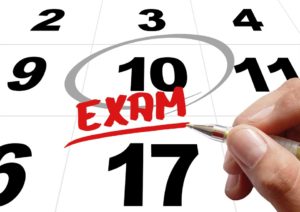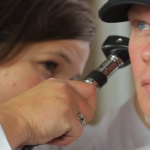Here Is What A DOT Physical Exam Covers
- Ears:

The doctor will check for any kind of blockage and structural abnormalities, like any holes present in the eardrum. You are required to have ‘forced whisper’ ranging at a distance of five feet or more, with/without any hearing aid. Plus, you should not have more than 40 dB of hearing loss, with/without any hearing aid.
You will be checked for breathing or swallowing problems or any other kind of throat or mouth problems, which typically will deal with sleep apnea.
The doctor will check your heart for any erratic beating, murmurs, or any other unusual sounds. You will be questioned to know if have a pacemaker or other device installed in the heart.
The doctor will check your blood pressure as well as the pulse rate to know if you have high blood pressure as well as irregular heartbeats.
The DOT exam medical examiner will listen as well as watch the breathing pattern you have. If he/she suspects any issues they might have to get a chest x-ray done.
If you snore or are using a CPAP machine, make sure to bring in your CPAP report so that your exam may be completed without you having to return. Without the report, your exam will be pended until the report is presented to the examiner.
Your vision will be tested and will need to be no worse than 20/40 in either eye or in both. If your vision is worse than 20/40, you need to be evaluated and fitted for corrective lenses.
- Urinalysis:
A urinalysis is needed for drug screen and glucose levels. Additionally, this test helps to know if you have any underlying medical conditions like diabetes. If you are a diabetic, please bring in your most recent A1C which should be 8% or below. Higher numbers or insulin dependent diabetics may be disqualified without a diabetic waiver.

- Abdomen and Organs:
The doctor will check for any masses or enlargements, odd tenderness upon palpitation, or any strange sounds.
- Vascular (blood movement):
Again, your blood flow and pulse will be examined at several points in your body to check if you have the varicose veins.
- Extremities or Limbs:
 The doctor will check if you have any missing limbs. He or she will also check for lack of strength, any weakness, and the range of movement in your limbs and extremities.
The doctor will check if you have any missing limbs. He or she will also check for lack of strength, any weakness, and the range of movement in your limbs and extremities.
- Neurological:
You will be checked for your stability, balance, mental clarity, reflexes, and your speech coordination.
- Spine/Skeletal:
The doctor will check your spine to check if there are any unusual or crooked areas or any weakness.
If you are being treated for a medical condition, please have your treating physician fill out this form prior to your exam. Failure to do so will delay your receiving your health card.
How often do you need the exam?
Generally, the physical examination is good for two years. However, if you have chronic diseases and other specialty health conditions, then you may have to be tested more often than that. The doctor conducting the DOT physical will have that information. The doctor will also have the necessary paperwork which you need to submit to the Department of Motor Vehicles to be issued the DOT license you are looking for.
What if you fail the test?
Failing the test does not necessarily mean that you are prohibited from becoming a driver. You should ask the doctor about the reason why you failed and improve the disqualifying health condition with treatment if possible and then try again. Retake the exam, our facility is a great place and is a top DOT physical locations in Charlotte NC .
The DOT physical examination accesses your general health and your emotional and mental fitness for meeting the demands of professional driving. It is primarily easy, fast and painless. Come in, listen to the simple instructions given to you by the doctor, and you will be out of the clinic in no time having the proper certification completed.

I am the administrator for the Charlotte DOT Exam facility, located in Charlotte NC. I oversee the facility services providing DOT exams in accordance with the standards of the FMCSA. We also provide DOT drug testing with MRO support when required. Drug testing can also be done for non-DOT exams such as pre-employment. In order to minimize wait times, I always encourage our clients to contact us first and make an appointment.
I would also suggest that each individual wanting to test for the CDL health card read the article “Preparing For Your DOT Exam” as it lists several things to bring to the test, such as CPAP usage reports and medicine lists.

